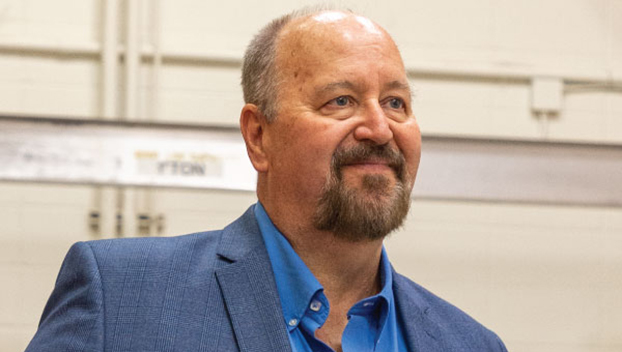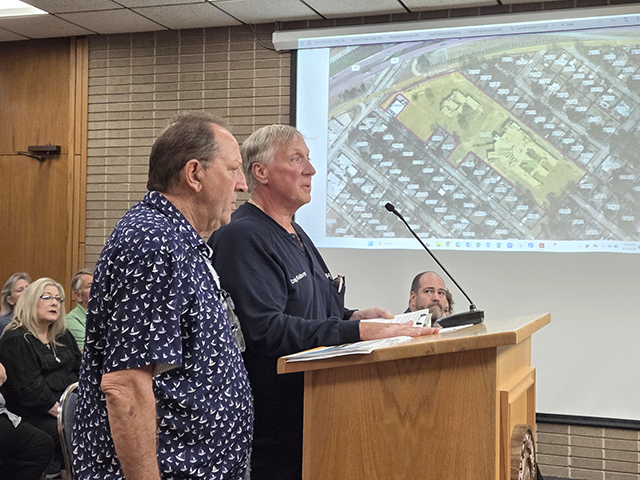Q/A with Dr. Daniel A. Brown, Lamar University’s new provost and vice president of academic affairs
Published 8:06 am Monday, August 1, 2022

- Dr. Daniel A. Brown
|
Getting your Trinity Audio player ready...
|
In his nearly three-decade career as an educator, Dr. Daniel A. Brown has built an extensive record of leadership, achievement and service as a professor, academic researcher and administrator.
Brown served as associate provost at Lamar University since 2020 and prior to joining LU, he served as dean of University College and director of the Personalized Academic and Career Explore Exploration Center at Texas State University (2011-2020).
Now, the Kansas native has been appointed as Provost and Vice President of Academic Affairs at Lamar University.
In this interview, Brown shares his history in education, his excitement in the new role and future vision for Lamar University.*
Q: Can you tell our audience about your background?
A: My academic path is fairly traditional. But I always like to say, first of all, in my family, I’m a Kansan married to a North Carolinian with a son who is a Texan. So, my family is at least batting one for three and many people are proud of us for that. I began my education at Pittsburg State University where I was a gorilla in Southeast Kansas, went down to Oklahoma State for my Ph.D. in plant pathology in the College of Agriculture and have been a faculty member at Eastern New Mexico University, Texas A&M University Kingsville –– the Javelinas, Texas State University, which are the bobcats, and now Lamar University and we’re very happy to be Cardinals in our household.
Q: What sparked your passion in education?
A: I will tell you: I had the most amazing experience in undergraduate education one could ever hope for and it was because of faculty mentors and it was because of staff that took an interest in my success. I want every student to have that kind of experience where they’re absolutely thrilled and excited when they get that email that talks about their university, when they have an opportunity to go to homecoming, or to a football game, or a basketball game or a baseball game. I want them to have that same experience. Then, I went on for my doctorate at Oklahoma State University and had an experience that was so amazingly positive that, I have said this many times, if everyone could have the experience I had under Dr. Bob Hunger at Oklahoma State University, we’d have a lot more Ph.D.s in agriculture, because it was absolutely the most engaging and challenging, but the most rewarding experience I could have at that level. So, I’ve had those wonderful educational experiences and now in my role, my passion is that today’s students have those same quality experiences, so that they can come out of their education wanting to achieve more, do more, be more as I did, based upon those experiences.
Q: You joined Lamar University in 2020 as Associate Provost for Academic and Faculty Affairs. What attracted you to LU?
A: I had known about Lamar University for some time because of my work with the Texas State University system, but it actually goes back further. When I was at Texas A&M University Kingsville, I was the search committee chairman for our search for the dean of the College of Engineering. So, we were looking at Lamar University’s College of Engineering as an example of what we would want to do with engineering at Kingsville. We had a successful search, it did not include a candidate from LU at the time, so I’ve known about it since then. But there are family connections as well with my son’s godparents –– their brother-in-law and sister-in-law were Tom Lamb of Lamb Printing. The first vice president to have ever hired me in higher education is a Mahaffey, famous, of course, for Judge Jim Mahaffey. So, we’ve had this relationship with Beaumont and then when the opportunity came to move here during the pandemic, we just went from one Buc-ee’s to another, all the way from San Marcos to Beaumont and made it a successful transition. Life has truly come full circle at this point.
Q: Since moving to the Southeast Texas area, what are some of your favorite things about Beaumont and the surrounding cities?
A: We’re very happy and we found Beaumont to be just an amazing community that we don’t think people know enough about. I’ve loved everywhere that I lived prior to this, so this is not an indictment of other places. But I don’t think people who don’t know Beaumont in 2022 appreciate how much there is right here in Jefferson County. Whether it’s selections of different food cultures, whether it’s still having Parkland Mall –– all of those pieces that we have here are amazing. Those who don’t know Beaumont or Southeast Texas don’t realize how much the city has to offer and how much it has changed over the years.
Q: Some may not realize the role that a provost plays at an institution. Can you expand on your role as provost and vice president of Academic Affairs at Lamar University?
A: Well, as provost and vice President for Academic Affairs, you have a lot of different hats. So, I just added up 13 direct reports as of today, but I’m responsible for the entirety of the academic affairs ecosystem: teaching and learning, student success is also a part of that; the academic colleges, the honors college, the graduate college; research and sponsored programs; assessment and accreditation; and institutional research. And of course, then I play the role in oftentimes stepping in for the president as the cause may be needed. So, I will step in for him with conversations with external and internal audiences and represent the university in that way.
Q: What are you most excited about with this role?
A: I think one of the most fun part of this job, to me, is working with other vice presidents, helping us to develop that campus culture –– that shared responsibility that’s going to be so responsive and so important to our growth and development in the future. Remember, there were three things I said at my interview –– culture, communication and coordination. I share President Taylor’s belief that a positive success-focused culture –– and everyone’s success, not just students’, but also faculty and staff –– that culture will be the key to our continued progress. Because one, it’s positive, it’s also team focused and I think that element of shared responsibility is really important in higher education today… shared voices so that all people know that they’re being heard is very important in higher education today. You know, I was on the presidential search committee and this is twice in my career, I’ve had that opportunity. And in both instances, it was stunning to me how quickly individuals separated themselves from the other candidates on the basis of their perspective, their attitude, their personality, their skills and abilities. And as it was, in a previous instance, President Taylor definitely found his voice in that interview and was the most wonderful candidate we could have picked up at that time for president.
Q: You’ve been here at Lamar University for nearly two years and you’ve been through one round of strategic planning for the university. How do you plan to use your extensive knowledge and passion in education to drive the forward mission of the university?
A: Now, I came in after the plan had been completed. So, what I’m doing now is preparing for what we call a mid-cycle revision of the strategic plan and with that, you start to really work with everyone once again and say, ‘Okay, what are our priorities? What are the things we really want to do?’ I really believe very simply, you know, ‘What are the handful of things, five things, that are absolutely essential for us to achieve?’ I’m absolutely committed to completing a piece that was kind of left on the back burner, and that is completing the element to make sure we have a strategic plan for diversity, equity and inclusion. I’m really excited with our new acting vice president in that area, Dr. Freddie Titus, who is going to help us really make progress in that area in a very short while.
Q: Lamar University has an enrollment of more than 17,000 students and approximately 20.9% of the student population is Hispanic. You have an extensive history with serving at designated Hispanic Serving Institutions. Will you be implementing any HSI initiatives at Lamar University in the future?
A: I think first and foremost, it’s the community you join. I was very successful in working within the developing Hispanic Serving Institutions program from the U.S. Department of Education. I’ve had seven successful HSI grants and so being committed to those outcomes has just been a part of my life on the last two cases I worked on. So, I look forward to taking those skills and those experiences out to work with our faculty and departments and programs so that I can kind of help them as we rapidly approach that. But I believe that the strength of coming from the developing HSI background is those grants are meant to strengthen institutional capacity to serve students. I love those terms –– strengthen institutional capacity to serve students, because while they’re HSI grants, they were intended to serve all students at the university. I think that from my perspective, an important part of thinking about diversity and equity is, ‘How are we going to serve our students so that all have the same opportunities?’
Q: What is your vision for Lamar University moving forward?
A: I want to support Lamar University in becoming nimbler, becoming more ready for the changes that are ahead. It used to be, probably once a generation, higher education made a specific shift. You’re looking around my office today and 25 years ago, I would have had wingback chairs and a nice fireplace that went into my office and a view outside on this tree-filled lawn. It was all about the look. I’m a working provost and I’m getting the job done. So, my vision is to support and encourage our faculty and staff in particular, our students as well, as I look forward and ask, ‘How do we become the university we need to be in the coming years?’ So, finding areas where we know that we can recruit and retain more students, graduate more students, and it’s also thinking about the degrees and certificates that tomorrow’s graduates are going to need in order to be successful in their careers. Our real strength is in the area of the professional doctoral programs and that’s where we have our doctorate or Ed.D. in Education, we have the Doctor of Audiology and Doctor of Engineering as examples. We have this strength there and I think it reflects the very best of Lamar University, which is we’re preparing our students for success in their chosen and professional careers.
*This Q&A has been edited for brevity.





